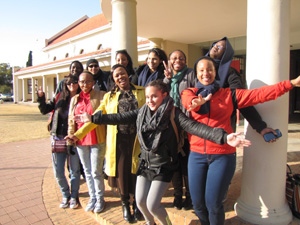 After a community engagement induction, Rutgers University students head out to visit communities.
Photo: Supplied |
The International Office and the Department for Community Engagement will host a week-long cultural immersion programme for eight students of Rutgers University from 27 July – 2 August 2014. The Rutgers Graduate School of Education's South Africa Initiative (SAI) bridges cultures, connects educators and provides hope for learners and students from South Africa and the United States.
This interdisciplinary programme provides teachers and students on both sides of the world with the opportunity to exchange information through service learning, training and distance technology. This leads to educational gains for students and educators in both countries.
The Rutgers group of master’s, PhD and undergraduate students will visit two NGOs working with children at risk in the community of Heidedal, namely Tshepo Foundation and Lebone Village. The week-long programme will include lectures on the social, cultural and historical background of pre- and post-apartheid South Africa. Speakers from various departments and faculties of the UFS will feature during this event. These include the Institute for Reconciliation and Social Justice, the Postgraduate School, the Department of History, African Languages, as well as Education.
Prof André Keet, Director of the Institute for Reconciliation and Social Justice, will share the transformation story of our university with the group. Dr Henriette van den Berg will speak on mentoring postgraduate students to become successful researchers of the future.
This year marks the 12th anniversary of the SAI Cultural Immersion Program and a fruitful partnership with the UFS and other South African universities. Over the years SAI has provided tonnes of school books and supplies which have been shared with more than 2 000 learners in South Africa. Special projects such as the Literacy Through Photography and Brielle Digital Stories Project have been conducted by SAI alumni in schools. These have resulted in thousands of dollars of support given directly to South African schools.